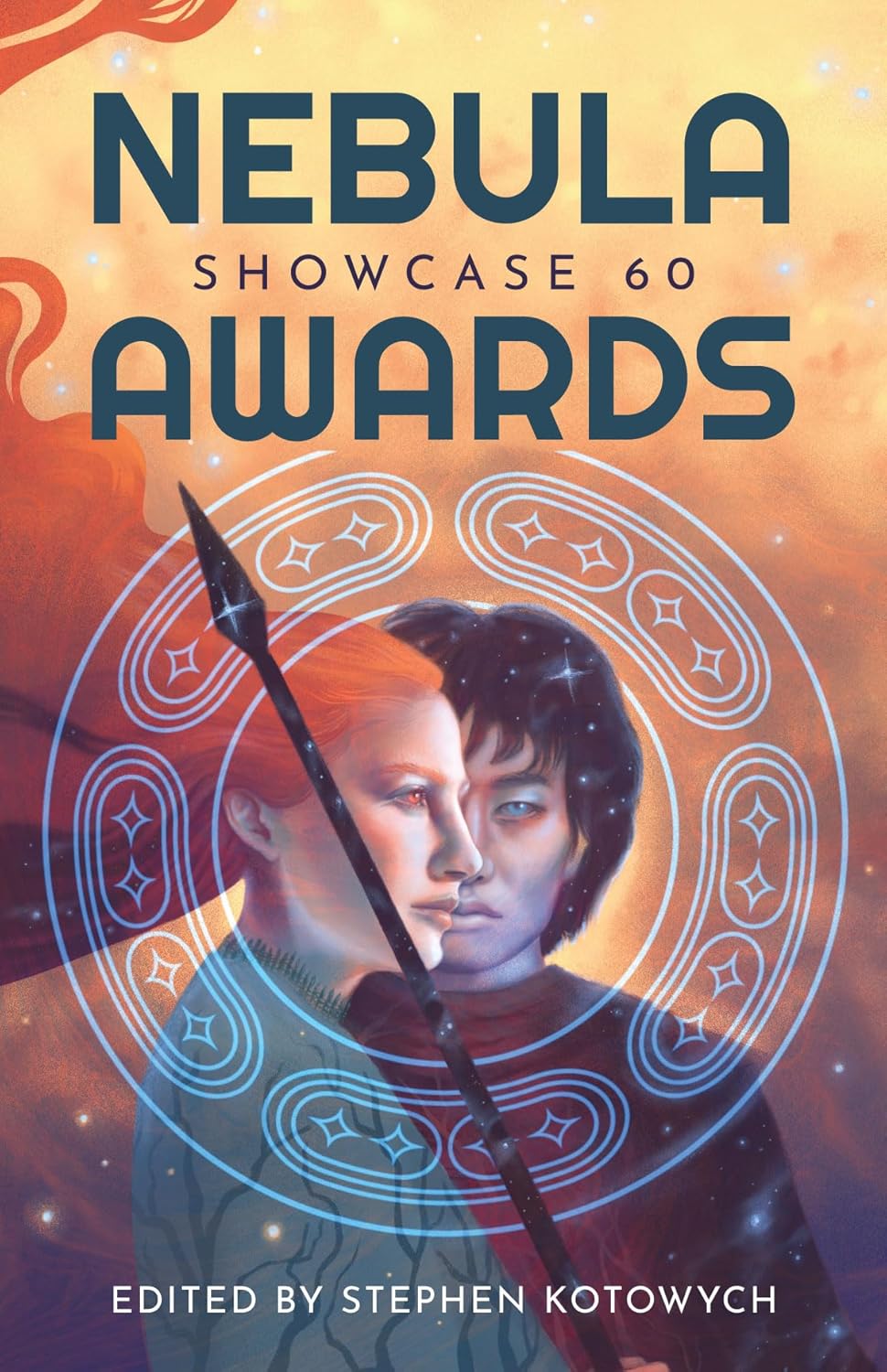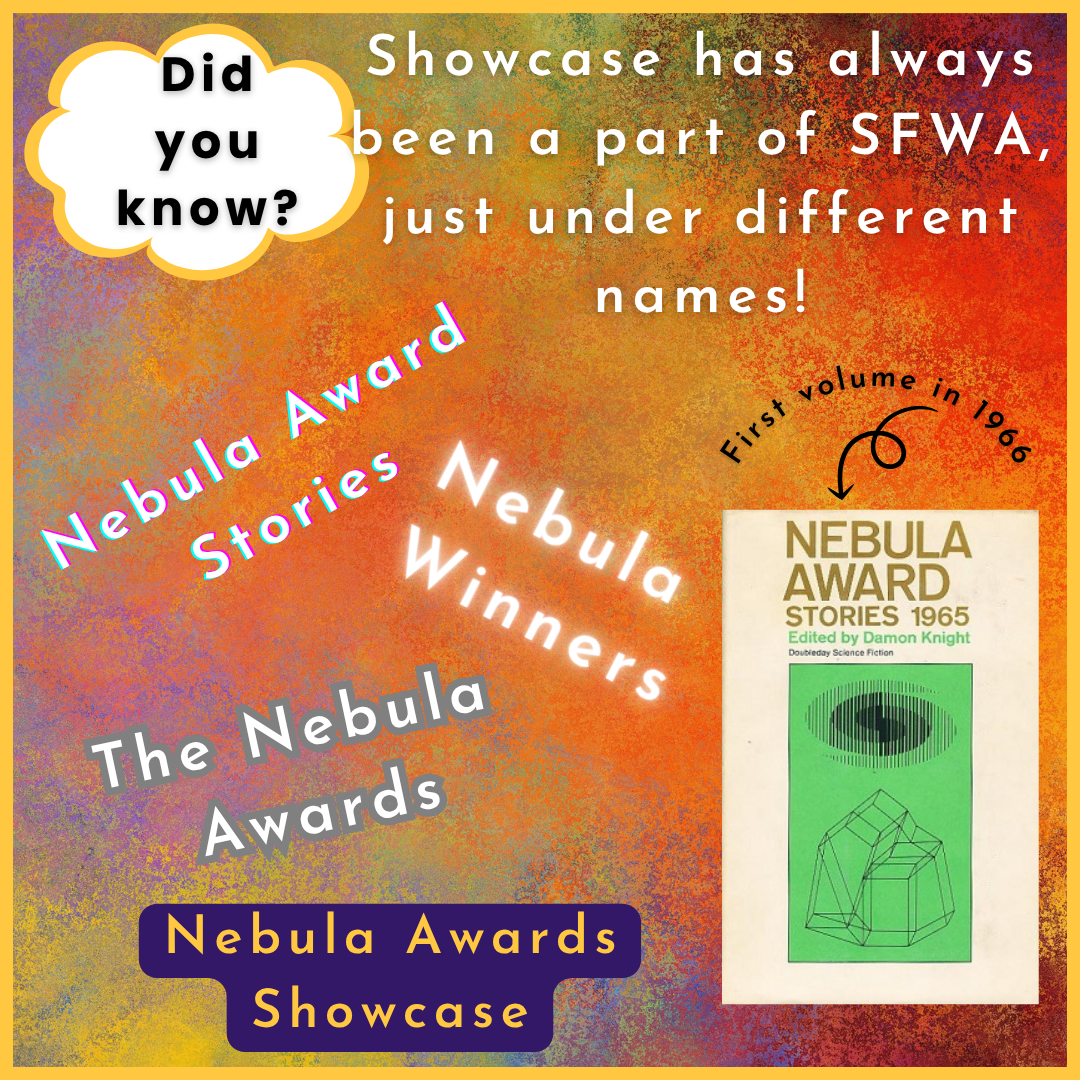by Janet Stilson and Stephen Kotowych

Editor’s note: This article is part of the SFWA Presents: Get to Know… series, which includes informational pieces about SFWA programs, committees, and initiatives, and also interviews with the SFWA volunteers who work to support their fellow writers in the industry.
To the untrained eye, it might seem like SFWA’s annual Nebula Awards Showcase volumes would be fairly simple to produce. What’s the big deal, right? Just reprint shorter prose that originally appeared in other publications and list descriptions of winners and finalists in other categories. All of them are the cream of the crop in any given year, according to SFWA voting members. In reality, the process is complex. A tiny, dedicated team rolls up their sleeves to make each volume a beautiful thing to behold. Leading the charge is Stephen Kotowych, the series editor, and M. L. Clark, SFWA’s communications and marketing coordinator.
In the following interview, Kotowych recounts how he leapt straight into the Showcase “fire” and explains some of the complications involved. He also describes how Showcase has needed to bend-and-flow during the current “golden age” of novellas. And he reveals why he finds the whole experience so rewarding.
Why did you decide to raise your hand when you learned that SFWA was looking for someone to work on the Showcase series?

Largely because I felt I had the skillset necessary…and because I didn’t quite know what I was getting myself into!
Late last year (2024), the then-Interim President Anthony W. Eichenlaub sent out an “ask not what SFWA can do for you, ask what you can do for SFWA” email asking people to think about one thing they could contribute to SFWA as the organization underwent some internal turmoil. Someone on the SFWA Discord wondered why we no longer put out the Nebula Awards Showcase volumes, and someone replied that Showcase 56 had essentially been sitting for years on a digital shelf somewhere, in need of a few final tweaks to be ready.
I spent 15 years as an acquiring editor in the Canadian publishing industry, and I’d already edited several indie SFF anthologies, including the Year’s Best Canadian Fantasy and Science Fiction series, which are published through my Ansible Press. So I was already familiar with the production needs of an anthology and had the skills to finish off Showcase 56 rather quickly. I’m a freelance business writer now and can make my own schedule, so I could also make the time around other projects.
With that background, I felt like the “one thing” I could do was to help get the Showcase series back on its feet, so I raised my hand. It was never pitched as “Here—now lead the Showcase series,” however. That offer came later from SFWA.
How much time was involved in getting the editions ready for publication? And what kind of tasks were involved?
After Showcase 56 was put to bed, I found out SFWA needed help getting Showcase 57, 58, and 59 done before the 60th Nebula Awards. Well, I was glad that I had the flexibility of a freelancer’s schedule because it did take a lot of time on a compressed schedule.
We brought out Showcase 56 through Showcase 59 between October 2024 and March 2025 and then went immediately into work on Showcase 60 to ensure we had physical copies available at the Nebula Award ceremony at the start of June. Having a whole year to plan Showcase 61 is going to feel like total luxury.
While Showcase 56 was basically done when I came on board, we had to put 57, 58, and 59 together from scratch—getting reprint permissions, signing contracts, commissioning a wonderful new interior layout to standardize the typeset and design for the series.

Can you tell us about any challenges you encountered during the process?
I think the biggest challenge was the compressed timeline. We caught up on five years’ worth of anthologies in the space of about five months. It was an exhilarating whirlwind, but it was a lot.
Other challenges included the persnickety-ness of all the individual ebook and print retailers. Each wants files in a slightly different format. No huge differences, but enough that it was time-consuming to get each one just so for each retailer’s in-house needs. So there was a lot of back-and-forth, uploading new files, particularly the covers. Even following their directions to the letter and using the templates they provided got us replies of “Just kidding—do it again this entirely different way.” Tons of fun.
There were also some unique challenges due to the unusual typesetting needs of certain stories in various showcase volumes. We had a wonderful new interior template designed for the series by Laurie McGregor at Page Turn—very clean and modern. That really helped in getting everything laid out the right way for those stories that needed special formatting to correspond with the authors’ vision of the text.
M. L. Clark really did amazing work wrangling InDesign to get everything laid out in our template for both print and ebook formats for each volume. I am completely indebted to them in that regard, as I am utterly hopeless with anything more than the most basic typesetting of simple paragraphs.
What did you find most rewarding, or meaningful, about the whole experience?
Well, it’s always rewarding to have a finished book in your hands. That never gets old.
It was also wonderful to get more of an insight into the behind-the-scenes workings of SFWA. I’ve never volunteered for the organization before, and I’ve only ever lurked on the chat boards. (I can’t keep up with the Discord, I’m afraid.) So, there were a lot of internal processes and volunteers I was previously unfamiliar with. It was really inspiring to see all the hard work that goes on behind the scenes to keep the organization up and running.
It was also great to interact with the authors who are included in the Showcase anthology. Some of them I’d met or interacted with online previously, but it was a real treat to get to know them a little better, even if only via email. Everyone was very encouraging and seemed really excited about the Nebula Showcase anthologies coming back after their unexpected hiatus.

It goes without saying that the anthologies can’t include entire novels—or all nominated novellas. They would be gargantuan! But it seems like excerpts might solve the problem. What was the reasoning when SFWA decided not to include excerpts in the novel category? And in the novella category, why only include an excerpt of the winner?
Yes, in our new format, we’ve elected to focus on publishing full stories and fewer excerpts or original essays. Reaction to so many excerpts of longer works in previous volumes was mixed. If you don’t believe me, you can go check out some of the reviews online.
Longer works like novels were meant to be experienced in full and not in part, so I can understand how some readers might feel frustrated to only get a section of a work. So, in the Showcase series going forward, you’ll be able to read the full short story and novelette winners and finalists. There will also be descriptions of winners and finalists in other categories, like the Best Novel, Andre Norton Nebula Award for Middle Grade and Young Adult Fiction, Ray Bradbury Nebula Award for Outstanding Dramatic Presentation, and Game Writing. Hopefully, that will intrigue readers enough to seek out those works in full.
One exception to this “no more excerpts” switch is in the Novella category. We’re living in a golden age of science fiction and fantasy novellas. Ironically, however, for the purposes of the Nebula Awards Showcase, this golden age poses certain problems. Unlike in years past, when we could have reprinted full novellas (published as they mostly were in SFF magazines where reprint rights would be available), many of today’s novellas are published as standalone books. As a result, reprint rights to the full work are simply not available.
So, in recognition of the novella’s special place as a mid-point between short fiction and novels, we have elected to offer an excerpt of the winning novella alongside descriptions of the finalists in that category, in hopes that the excerpt and the descriptions will whet readers’ appetites for the complete stories.
As with all things Nebula, this new format is a stage in the ever-evolving presentation of the awards. We may tweak it or adjust it or toss it out in years to come. We’ll have to see how it is received. But for now, we mostly hope people enjoy the books.
Were there particular stories that really stood out for you personally in the issues you worked on?
Haha—yes. But I’ll never tell. As the series editor, I should probably appear as neutral as possible.
Thank you, Stephen, for sharing your perspective and for your work in guiding the Showcase series forward.
Recent Nebula Award Showcase volumes are available on a wide variety of retail sites. Next year’s volume will be available for preorder shortly before the annual Nebula Award ceremony takes place.
Explore more articles from SFWA Presents: Get to Know…
 Award-winning author Stephen Kotowych has been hailed as one of speculative fiction’s “talented up-and-comers” by Publishers Weekly, and as the author of “gloriously wild ideas” by Locus. He is a World Fantasy Award finalist and winner of Canada’s Aurora Award, Spain’s Premi Ictineu, and the Writers of the Future Grand Prize.
Award-winning author Stephen Kotowych has been hailed as one of speculative fiction’s “talented up-and-comers” by Publishers Weekly, and as the author of “gloriously wild ideas” by Locus. He is a World Fantasy Award finalist and winner of Canada’s Aurora Award, Spain’s Premi Ictineu, and the Writers of the Future Grand Prize.
His stories have appeared in numerous magazines and anthologies and have been translated into a dozen languages. In addition to serving as the series editor for the Nebula Award Showcase, he is the series editor and publisher of the Aurora Award-winning Year’s Best Canadian Fantasy and Science Fiction series.

Interviewer Janet Stilson is an award-winning writer whose novels, The Juice and Universe of Lost Messages, are sci-fi rollercoaster rides that imagine the future of huge media companies and how they’ll shape our lives even more than they do today. Find out more at janetstilson.com.
